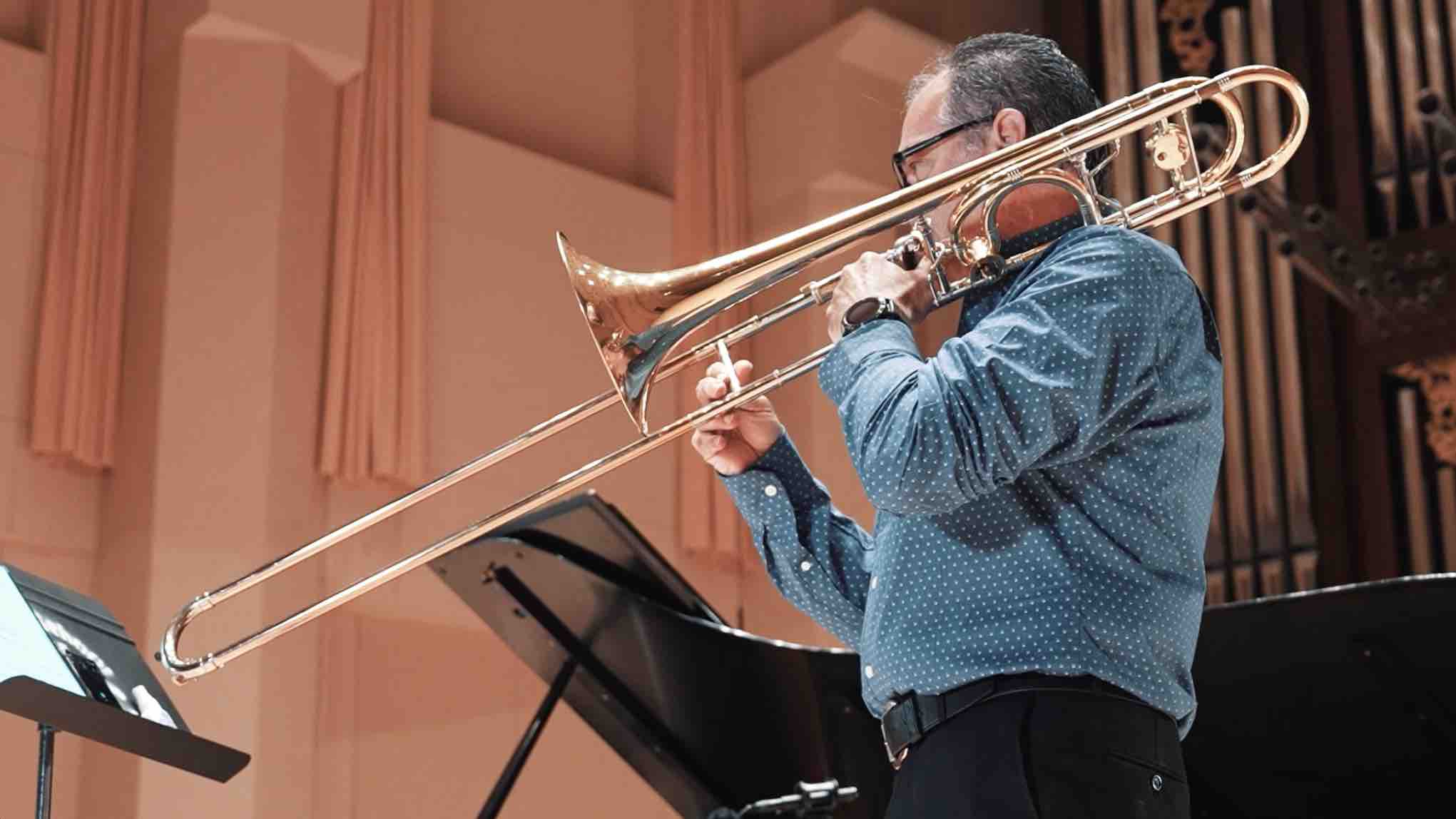Video Project Revisits Brent Phillips’s Musical Milestones

Brent Phillips, M.M., Professor of Trombone, can still recall the smell of the worn, parchment-like score of David Martin’s “Ballade” from his undergraduate years at Rice University. When 19-year-old Phillips realized the piece demanded some extra practice, he snuck the score from the trombone studio’s high-security file cabinet and made a practice copy across the street at Kinkos.
As he poured over the yellowed pages, Phillips became deeply familiar with the markings of the many trombonists who had come before him and attempted “Ballade.” “Many of the markings were conflicting and you could tell there were multiple iterations of each phrase—positions were marked, erased, re-marked, and breath marks had been tirelessly worked out,” he recalls.
During those intense hours with “Ballade” and the graphite spirits of his predecessors, Phillips says he realized his place in the larger picture: “I was part of a legacy of trombone playing, a school of pedagogy and thought and that I was not to travel lightly along this path.”
Now on the Baylor Music Faculty since 2004, the principal trombone of the Waco Symphony and Abilene Symphony, and director of the Mountain Light Music Festival, Phillips is revisiting “Ballade” and six other substantial works for trombone and piano. He calls it the Dispensation Project, “dispensation” referring to “the divine ordering of the affairs of the world; an appointment, arrangement or favor, as by God.”
Alongside collaborative pianist Yu-Chien Huang (M.M. ’24), Phillips is recording and releasing videos of each piece on the Baylor Trombone Studio YouTube channel and website, filmed in Jones Concert Hall by Video Production Specialist Carlos Monzón. The works he chose to share represent periods of his own musical, artistic, personal and spiritual growth, and accompanying blogs will detail his reflections on those experiences. “Each piece carries with it a stamp,” he says. “Each stamp is unique and was earned.”
As a teacher and mentor to young trombonists tackling many of the same pieces, Phillips looks back on his first attempts with a healthy balance of grace and wisdom. “If I was able to go back in time and have a conversation with my younger self, I wouldn't punish him,” he says. “I would be kind and empathetic and congratulatory. But I would also say, ‘You don't have to prove everything right now. You don’t have to offer up your entire being and soul and every ounce of endurance and technique and muster all this energy every time you pick up the trombone.’”
One of the most enduring lessons Phillips learned is that the trombone must be as delicate as it is bold—“playing in an artful and musical way that draws the listener in” rather than simply hammering an idea. Mastering nuanced artistry, he says, takes technical finesse in addition to intangible qualities like self-control, discipline and maturity—one of the stamps he picked up with “Ballade.”
“I always favored big, broad, powerful gestures and because of this lacked a certain nuance,” he says. “My heroes always sounded impressive, and I thought everything was about the peaks of the phrase. I am much more interested in the way to end a note and how soft I can play now. I crave delicacy, finesse and long, extended phrases.”
Phillips now presents this same challenge to his students. It’s one of the many vital lessons they must learn in the practice room, Phillips says, likening the intense experience to working “out your own salvation with fear and trembling,” as described in Philippians 2:12. “The same is true with our musical ability,” he says. “The artist's practice room is a peculiar and sacred space. We work through many areas of our musicality, spirituality and mental toughness, and seek to perform from a place of honest transparency and authenticity. There is a school of playing and a necessary body of fundamentals, routine and life cycle that is embedded in our craft. And this is where all this begins: in the practice room—by yourself.”
In this daunting process, Phillips believes it’s important to exhibit humility and vulnerability. “There’s not a day that goes by that I don’t say to my students, ‘I remember when I absolutely crashed and burned on this piece. I know how you feel right now—it seems like it’s the end of the world and it seems irrecoverable, but it’s absolutely a required and necessary part of the process to you getting better.’”
Ultimately, Phillips says his years of intense work in the practice room taught him that resilience is paramount to being a successful musician, student, artist, or scholar. Because he believes this principal extends beyond the classroom, Phillips will utilize his role as a Faculty in Residence at the Honors Residential College to host a formation series on resilience in the spring. They will discuss concepts around ideas of mental, spiritual and physical resilience, handling adversity, developing fortitude through our excellence in service through lectures and a focus group.
Phillips hopes the Dispensation Project will become an enduring resource in the YouTube canon for audiences even beyond his studio.
“The vehicle is a wellspring of stories, experiences, and an opportunity to share my path,” he says. “I plan on writing about relationships, conductors, rehearsals, practice, auditions, study, orchestra playing, success and failures. These pieces bring back a flood of experiences that I think my students will enjoy hearing. I believe the maturity gained from living life makes these works deeper and more meaningful to me and the listener now.”